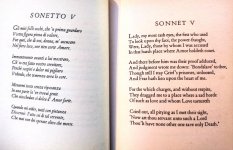The Panther : In Jardin des Plantes, Paris
by Rainer Maria Rilke
by Rainer Maria Rilke
| German Sein Blick ist vom Vorübergehn der Stäbe so müd geworden, daß er nichts mehr hält. Ihm ist, als ob es tausend Stäbe gäbe und hinter tausend Stäben keine Welt. Der weiche Gang geschmeidig starker Schritte, der sich im allerkleinsten Kreise dreht, ist wie ein Tanz von Kraft um eine Mitte, in der betäubt ein großer Wille steht. Nur manchmal schiebt der Vorhang der Pupille sich lautlos auf –. Dann geht ein Bild hinein, geht durch der Glieder angespannte Stille – und hört im Herzen auf zu sein. | English His gaze against the sweeping of the bars has grown so weary, it can hold no more. To him, there seem to be a thousand bars and back behind those thousand bars no world. The soft the supple step and sturdy pace, that in the smallest of all circles turns, moves like a dance of strength around a core in which a mighty will is standing stunned. Only at times the pupil’s curtain slides up soundlessly — . An image enters then, goes through the tensioned stillness of the limbs — and in the heart ceases to be. - English translation by Stanley Appelbaum | English His vision, from the constantly passing bars, has grown so weary that it cannot hold anything else. It seems to him there are a thousand bars; and behind the bars, no world. As he paces in cramped circles, over and over, the movement of his powerful soft strides is like a ritual dance around a center in which a mighty will stands paralyzed. Only at times, the curtain of the pupils lifts, quietly--. An image enters in, rushes down through the tensed, arrested muscles, plunges into the heart and is gone. - English translation by Stephen Mitchell | English His gaze has, from the passing of the bars, grown so weary that it cannot hold. To him, there seem to be thousand bars and behind those thousand bars no world. The smooth pace, the strong and supple stride, that circles in the smallest space, is like a dance of force around a middle, in which a strong will’s paralysed. Only at times the pupil’s veil lifts without a sound –. An image enters, moving through the body's rigid hush- and in the heart ceases to be. - English translation by A.F. |


